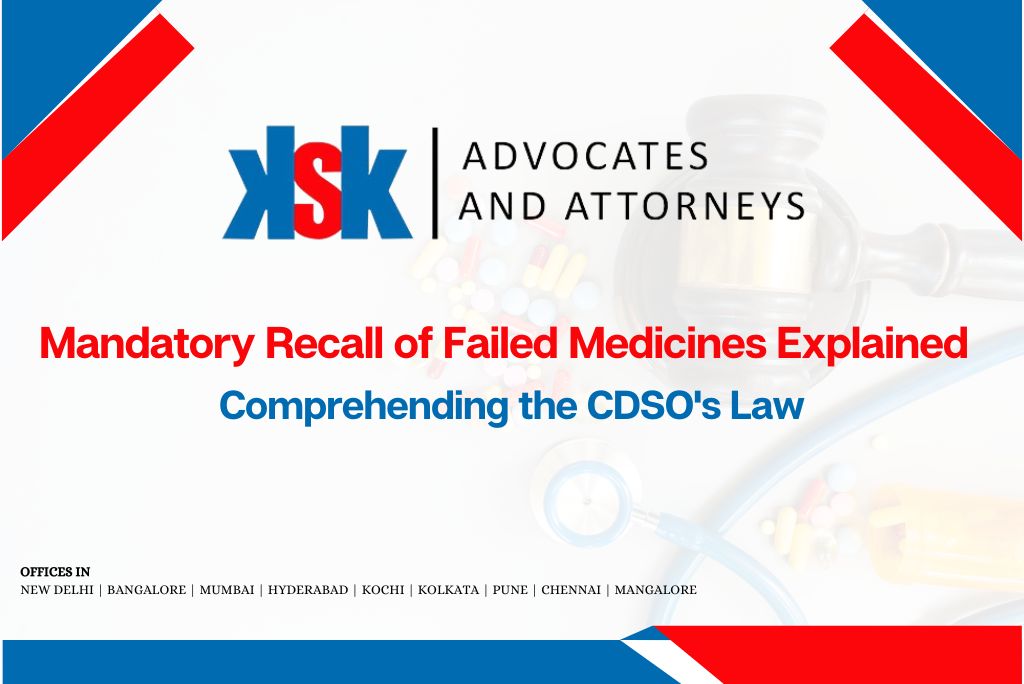
By - King Stubb & Kasiva on May 25, 2023
India is one of the world’s leading producers of generic pharmaceuticals, accounting for roughly one-fifth of global generic pharmaceutical exports by volume.[1] Nonetheless, assuring the quality and safety of the country’s drug supply and the drug market is a major concern. According to the World Health Organisation (WHO), roughly 10.5% of drugs globally are substandard drugs or counterfeit drugs, with approximately one in every ten medical items in nations with low or middle incomes being substandard or counterfeit.[2] This global problem endangers public health and safety. Substandard and counterfeit drugs are common throughout India.
Despite being a significant global player in the industry, the lack of a specific substandard drug recall law exposes patients to the dangers associated with defective or substandard drugs. The current regulatory framework relies primarily on provisions dispersed across numerous statutes and regulations, resulting in an ad hoc approach to drug recalls. Inadequate drug recall laws have repercussions that extend beyond compromising patient safety. The absence of a streamlined process harms the reputation of the pharmaceutical industry, erodes public trust, and raises international stakeholders’ concerns. It also impedes the ability of drug manufacturers to promptly resolve safety concerns and protect their brand image.
The recent occurrence of Abbot, a multinational pharmaceutical company’s notice regarding a mislabelled batch of medicine has further raised concerns regarding recall law in India. Considering these pressing concerns, India must implement a comprehensive drug recall law that includes clear procedures, defined responsibilities, and severe penalties for noncompliance. This article will analyse India’s position on this in the following manner:
India has several regulations in place concerning the pharmaceutical industry, which govern the manufacture, distribution, and sale of drugs. These regulations aim to safeguard public health, ensure drug quality, and maintain ethical standards within the pharmaceutical industry.
The Drug and Cosmetics Act of 1940[3] is the basis for drug regulation in India. It establishes the legal framework for the import, production, distribution, and sale of drugs. The act contains provisions regarding the licensing, labeling, advertising, and quality control of pharmaceuticals. It authorizes the CDSCO to implement regulatory measures and initiate action against manufacturers or distributors who do not comply.
The CDSCO, which is overseen by the Ministry of Health and Family Welfare, is India’s major drug regulating authority. It is critical in the approval of new pharmaceuticals, the granting of licenses to manufacturers, and the oversight of clinical trials.
The recent New Drugs, Medical Devices, and Cosmetics Bill 2022[7] does provide for the recall of “Ayurveda, Unani, Siddha, Sowa-Rigpa, Homoeopathy drugs”, but does not deal with the recall of Allopathic drugs.
Despite there being comprehensive regulations governing the pharmaceutical industry and the drug market, no rules or regulations provide for a drug recall law. There have been several discussions, such as by the Drugs Consultative Committee (DCC) and the CDSCO in 1976[8], and even in recent years in the 2018-19 meetings, but no such law to recall substandard drugs has been enacted. The reasons behind the same are:
Given the recent and rare occurrence involving a mislabelled batch of medication supplied by Abbott, India is in dire need of a comprehensive drug recall law, as is quite common in the US. Such legislation would provide a systematic and standardized approach to comparable situations, ensuring that drug manufacturers take swift action to correct errors and safeguard the public’s health and safety.
By enacting a comprehensive drug recall law, India can strengthen its commitment to public health, improve industry accountability, and bolster its position as a global leader in the pharmaceutical industry.
Overall, the absence of a comprehensive drug recall law in India emphasizes the necessity for prompt action. Developing such laws is critical for protecting public health, increasing consumer confidence, encouraging industry accountability, improving post-market surveillance, and adhering to international norms. By establishing a thorough drug recall law, India can assure the quick and effective removal of hazardous drugs from the market, protecting citizens’ health and enhancing the reputation of its pharmaceutical industry.
India lacks a comprehensive drug recall law due to a fragmented regulatory structure, insufficient post-market surveillance, shifting regulatory priorities, legal and procedural hurdles, and industry concerns.
A comprehensive drug recall law protects public health, boosts consumer confidence, promotes business accountability, improves post-market surveillance, and ensures the quick and efficient removal of hazardous drugs from the market.
In the United States, the Food and Drug Administration (FDA) oversees a well-established drug recall system. The FDA can recall drugs and take the necessary precautions to protect public health. Notifying healthcare professionals and the general public, categorizing recalls based on risk, and working closely with pharmaceutical companies for proper recall execution are all included in the process.
[1]https://www.ibef.org/industry/pharmaceutical-india.
[2]https://www.who.int/news/item/28-11-2017-1-in-10-medical-products-in-developing-countries-is-substandard-or-falsified.
[3]https://cdsco.gov.in/opencms/export/sites/CDSCO_WEB/Pdf-documents/acts_rules/2016DrugsandCosmeticsAct1940Rules1945.pdf.
[4]https://cdsco.gov.in/opencms/opencms/system/modules/CDSCO.WEB/elements/download_file_division.jsp?num_id=OTg4OA==.
[5]https://cdsco.gov.in/opencms/export/sites/CDSCO_WEB/Pdf-documents/New-Drugs/Process/NDD_APPL_Organogram.pdf.
[6]https://cdsco.gov.in/opencms/export/sites/CDSCO_WEB/Pdf-documents/import-registration/Import_guidance_doc.pdf.
[7]https://main.mohfw.gov.in/newshighlights-97.
[8]https://cdsco.gov.in/opencms/opencms/system/modules/CDSCO.WEB/elements/common_download.jsp?num_id_pk=ODUy.
King Stubb & Kasiva,
Advocates & Attorneys
Click Here to Get in Touch
New Delhi | Mumbai | Bangalore | Chennai | Hyderabad | Mangalore | Pune | Kochi | Kolkata
Tel: +91 11 41032969 | Email: info@ksandk.com